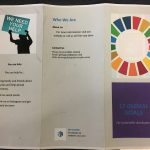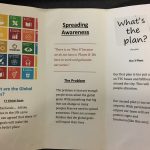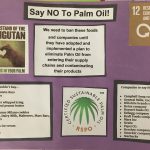This unit focuses on the UN’s Sustainable Development Goals and social entrepreneurship. The culminating task requires students to identify problems related to the Goals and develop innovative and achievable solutions that facilitate change.
Team Members
Julia Hanson
Toronto District School Board
Anne Gillard
Toronto District School Board
Sara Tanouye
Toronto District School Board
Chantale Fullard
Toronto District School Board
Professional Learning Goals
- We engaged in meaningful professional learning through collaboration with one another and by finding resources created by experts in various fields (e.g., related to global citizenship and social entrepreneurship)
- We devised ways to implement the revised geography curriculum in order to emphasize the Global Competencies, and encouraged students to become responsible global citizens who will be problem solvers and agents of change
- We began to explore ways to use the SAMR model to design a unit of inquiry that integrated technology in a meaningful way through both innovative lesson design and assessment. We intend to continue to work towards this goal.
Activities and Resources
This unit plan implements the revised geography curriculum, including all four elements of the Citizenship Education Framework. The culminating task will act as an introduction to the United Nation’s Sustainable Development Goals and social entrepreneurship, teaching our students to create innovative and achievable solutions to society’s most pressing issues.
For the culminating task, students will brainstorm social issues that they are passionate about and create a heartbreak map. They will then select one particular issue that relates to the UN’s Sustainable Development Goals. Students will act as social entrepreneurs in order to create an action plan that outlines an innovative and achievable solution for this social issue. Students will share their action plan with their peers during a Market Place.
Unexpected Challenges
- Not all classes were able to consistently access technology and connectivity to the Internet (e.g., Wi-Fi, computers)
- It took us longer to frontload/teach the unit and complete the geographic inquiry task than we expected, so we didn’t have enough time to spend on the action plan (in terms of the students having an opportunity to connect or collaborate with experts, or actually follow through on their action plans)
Enhancing Student Learning and Development
- Students were provided with the opportunity to develop a number of skills related to the inquiry process (formulating rich questions, determining the reliability of primary and secondary sources, analyzing data and evidence, synthesizing information and drawing informed critical judgments, and communicating their conclusions)
- Students were provided with the opportunity to apply the geographic thinking concepts in order to think critically like a geographer, which will hopefully help to shape their future learning in geography
- Students were provided with learning experiences that hopefully allowed them to develop a greater appreciation and respect for natural and human environments and communities
- Students were provided with meaningful, authentic opportunities for learning
- Through the use of social media, students worked to develop the skills and practices of responsible digital citizens in the hopes of creating more positive digital footprints
- Students were encouraged to see their potential as social entrepreneurs and agents of change
Sharing
- Throughout the implementation of the unit, we collaborated and partnered with other Grade 7 and 8 geography and English teachers at our school in order to build capacity with the Revised Geography Curriculum
- Throughout the unit, we used social media (Twitter, Instagram) to communicate our professional learning and our students’ learning
- We will continue to seek out opportunities to share our learning through family of schools, regional or board-wide professional learning opportunities
- We will submit a summary of our work to the Toronto District School Board’s department of Social and World Studies & the Humanities
Project Evaluation
- We were successful in engaging in meaningful professional learning through collaboration with one another, and we were able to find useful resources (e.g., related to global citizenship and social entrepreneurship)
- We were successful in devising ways to implement the revised geography curriculum in order to emphasize the Global Competencies
- Going forward, we intend to further develop our use of the SAMR model (Substitution, Augmentation, Modification, Redefinition) in order to continue to move away from using technology as a tool to enhance learning to a tool that transforms learning. We would like to continue to explore innovative ways for students to learn about the Global Goals by connecting more with the global community using social media, Skype conferencing and Google Earth. We would also like to explore meaningful ways for students to share their learning and raise awareness about the Global Goals using social media (i.e., Twitter, blogging, Instagram).
Resources Used
Bornstein, David, and Susan Davis. Social Entrepreneurship: What Everyone Needs to Know. Oxford: Oxford UP, 2010. Print.
Martin, Roger L., and Sally R. Osberg. Getting Beyond Better How Social Entrepreneurship Works. Boston, MA: Harvard Business Review, 2015. Print.
Reimers, Fernando, Vidur Chopra, Connie K. Chung, Julia Higdon, and E. B. O’Donnell. Empowering Global Citizens: A World Course. North Charleston, SC: CreateSpace Independent Platform, 2016. Print.
Wagner, Tony, and Robert A. Compton. Creating Innovators: The Making of Young People Who Will Change the World. New York, NY: Scribner, 2015. Print.
Provides information about the United Nations Sustainable Development Goals and their individual targets
Provides information and resources for teachers related to the United Nations Sustainable Development Goals
Online story map that explains the Global Goals and provides some statistics for individual countries related to various goals
http://sdgs.maps.arcgis.com/apps/MapJournal/index.html?appid=c921e7d2cfef4c8ab98b839e27eda74a
Provides a number of engaging videos related to quality of life around the world, based on statistics
Interactive website that allows students to explore quality of life around the world based on income, using photos as data
Comic book version of the Global Goals and related targets, written for students
Provides guidelines for students to write letters to newspaper editors and politicians, and delivering a laser talk (a format for issue-based public speaking)
Online quiz that helps students determine their global citizen type/style (e.g., hands-on versus start-up)
http://together.akfc.ca/exhibit/en/global-development/take-the-global-citizen-quiz
Provides a number of articles, videos related to the Global Goals and actions one can take for global citizenship
- Les chemins de l’école. Émissions, TV5, DVD
- Video includes three episodes of nine children around the world and their triumphs and challenges they face in order to get to school
- Before the Flood. National Geographic – Ratpac Documentary Films, 2016.
- 2016 documentary film about climate change
- “StopGap.” The Rick Mercer Report. YouTube. Uploaded by MercerReport, November 16, 2016. Accessed January 2017.
- A video to help students understand social entrepreneurship
- Ngabo, Gilbert. “U of T Students turning coffee grounds into fuel for refugees” Metro Published on January 12, 2017. Accessed January 2017.
- An article of an example of local social entrepreneurship in Toronto
http://www.metronews.ca/news/toronto/2017/01/12/students-turn-coffee-grounds-into-firewood.html.
Resources Created
These resources will open in your browser in a new tab, or be downloaded to your computer.





